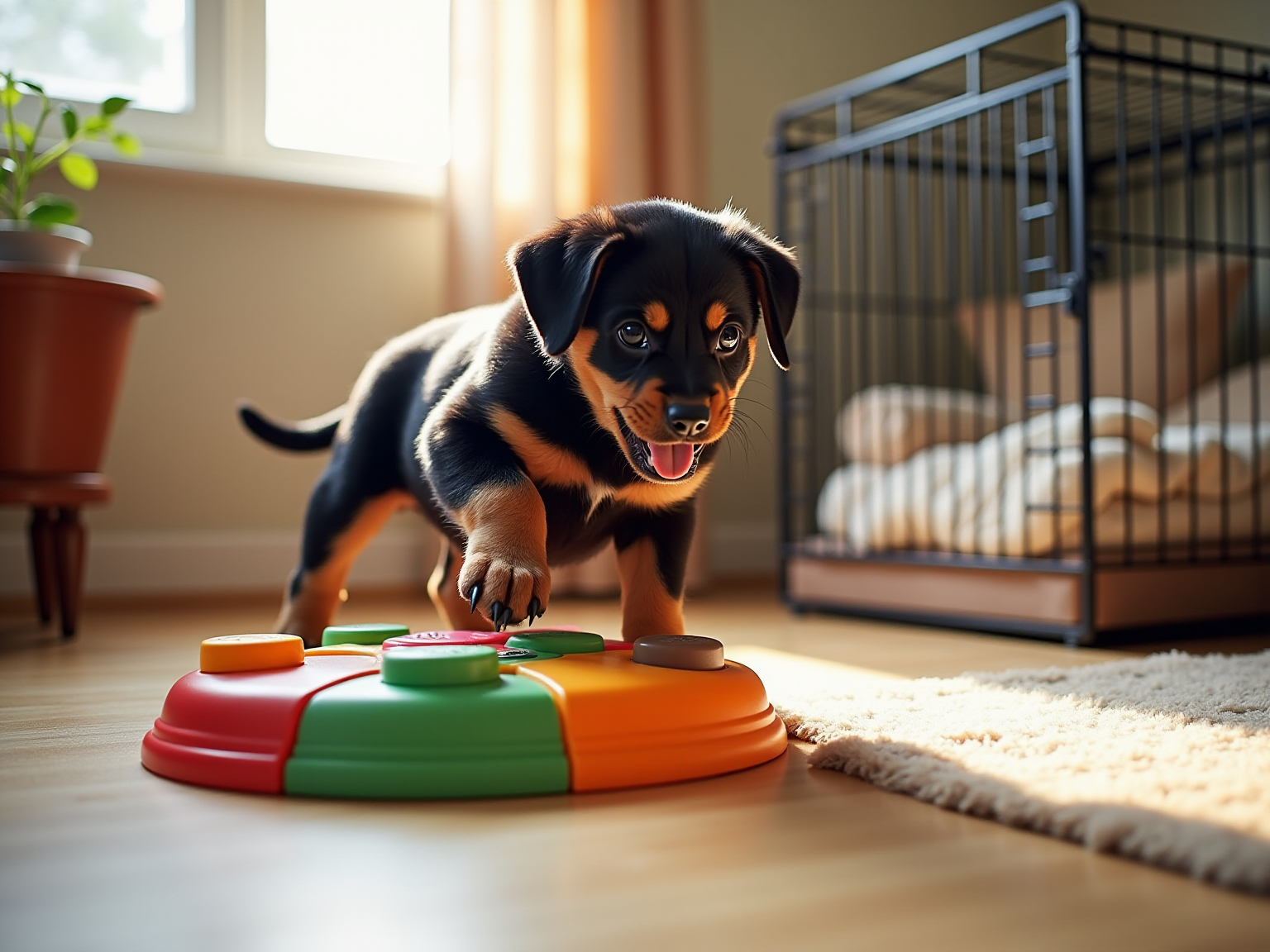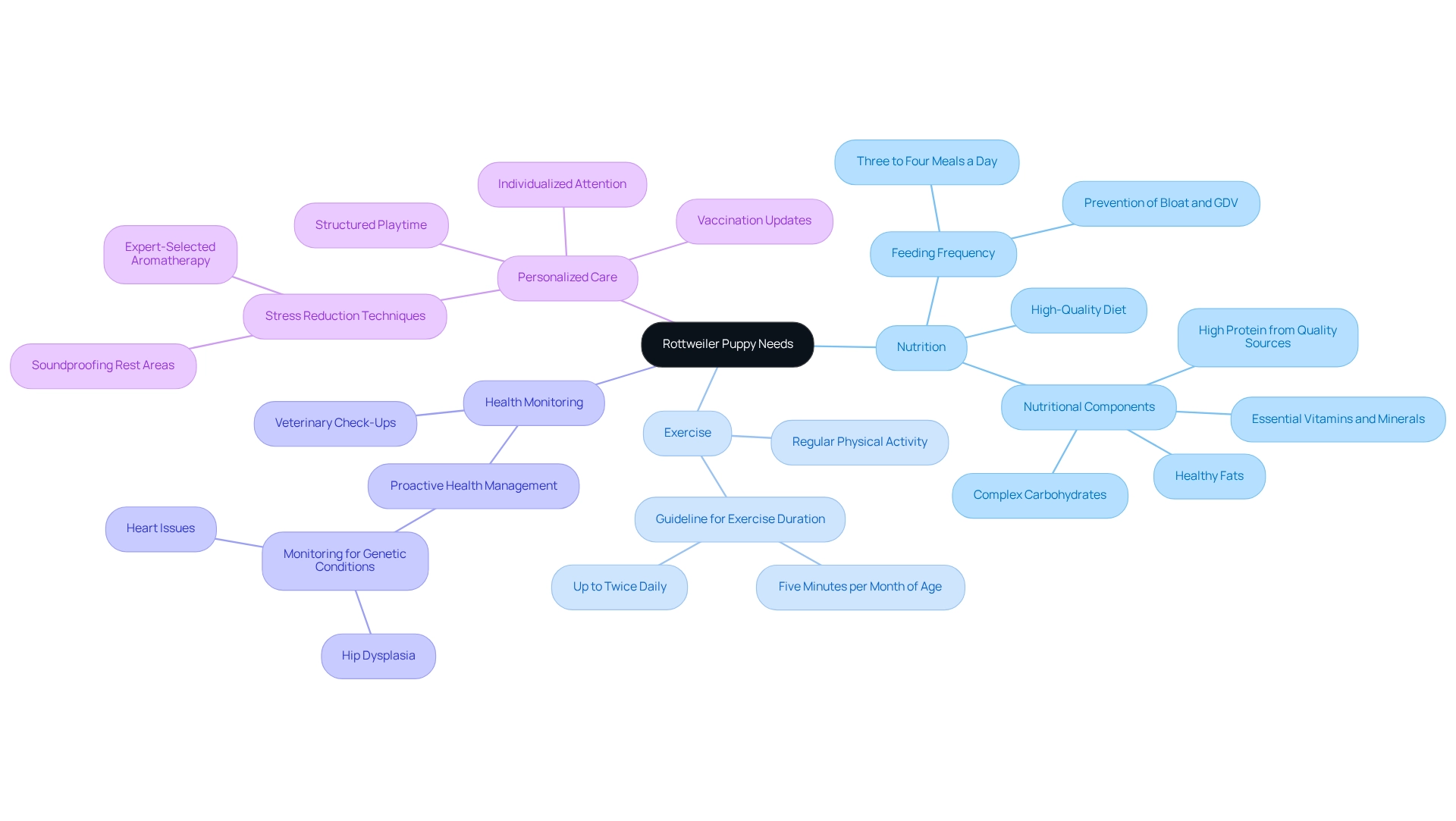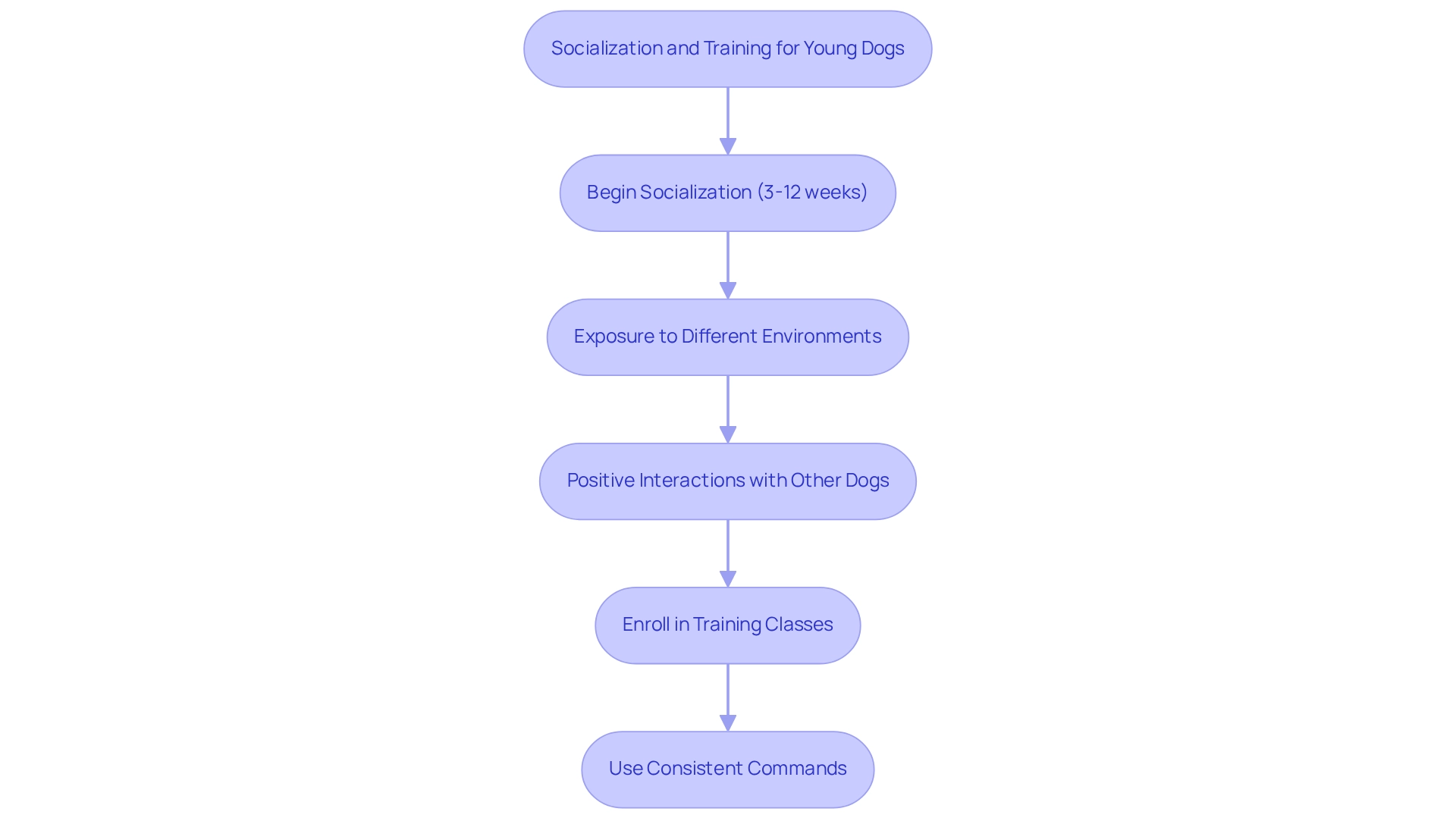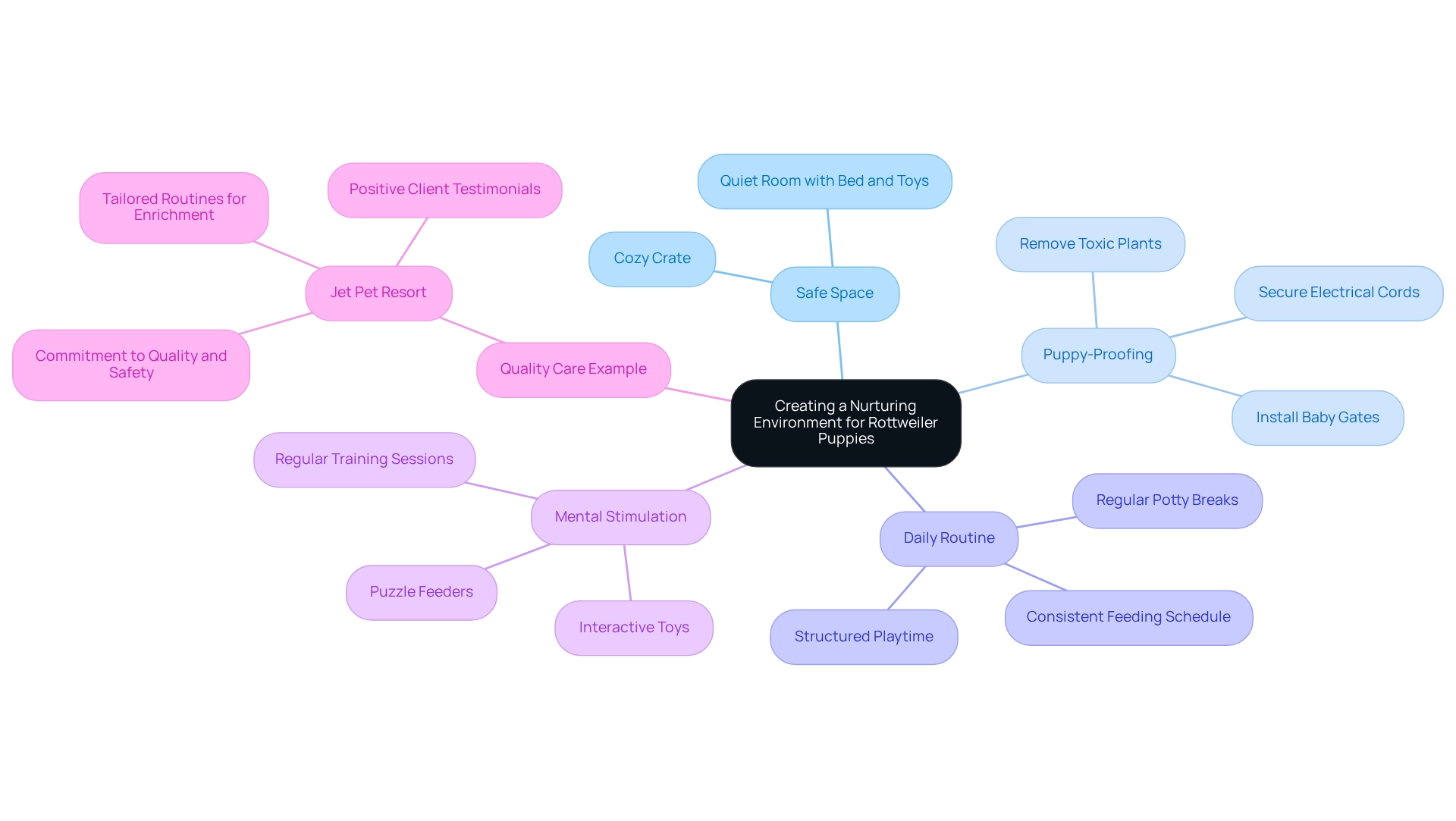
3 Essential Practices for Caring for Rottweiler Puppies
Overview
Caring for Rottweiler puppies involves three essential practices that truly matter:
- Understanding their specific nutritional and exercise needs
- Prioritizing socialization and training
- Creating a nurturing environment
It’s important to recognize that a tailored diet, regular physical activity, and early socialization are not just recommendations; they are crucial for their healthy development. Moreover, a safe and structured home environment plays a significant role in fostering their well-being and adaptability. By focusing on these aspects, you can ensure that your beloved puppy grows up happy and healthy, surrounded by the love and care they deserve.
Introduction
Welcoming a Rottweiler puppy into your home is not just an exciting journey; it’s a heartfelt commitment filled with both joy and responsibility. These robust and energetic dogs deserve a thoughtful approach to care, ensuring they develop into well-adjusted adults.
As you embark on this journey, it’s essential to understand their unique nutritional needs and to establish a nurturing environment, as every aspect of their upbringing plays a critical role in shaping their future.
Early socialization and training are vital in fostering their adaptability and confidence, paving the way for a harmonious relationship with both humans and other pets.
This article explores the key components of Rottweiler puppy care, offering valuable insights for new owners who are eager to provide their furry companions with the best possible start in life.
Understand Rottweiler Puppy Needs
Understand Rottweiler Puppy Needs
Caring for Rottweiler puppies requires a thoughtful approach that acknowledges their robust build and energetic nature. It’s essential to understand their specific needs to help them grow into healthy adults.
Nutrition for Rottweiler puppies involves providing a high-quality diet that focuses on protein and essential nutrients. Opt for dog food specifically formulated for large breeds, as this supports their rapid growth and development. Feeding them three to four times a day is advisable to maintain their energy levels and prevent hypoglycemia, a concern that can arise from irregular feeding schedules. Additionally, offering multiple meals helps mitigate the risk of bloat and gastric dilatation-volvulus (GDV), conditions that are more likely with a single large meal. As veterinarian Heather Newett insightfully points out, “Doberman Pinschers and Rottweilers are both German working dogs, and both have short, smooth coats with similar colorations,” underscoring their unique nutritional requirements.
Regular physical activity is essential for Rottweiler puppies to develop strong muscles and bones. Engage them in short, frequent play sessions, gradually extending the duration as they grow. A helpful guideline is to provide five minutes of exercise for each month of their age, up to twice daily, ensuring they remain healthy and well-adjusted.
Health Monitoring: Consistent veterinary check-ups play a vital role in tracking growth and spotting potential health issues early on. Rottweiler puppies are prone to certain genetic conditions, such as hip dysplasia and heart issues, which makes proactive health management important. Regular assessments ensure that any concerns are promptly addressed, contributing positively to their overall well-being.
At Jet Pet Resort, the commitment to personalized care highlights the importance of individualized attention in fostering healthy growth for young dogs. This includes soundproofing rest areas to reduce stress, expert-selected aromatherapy for relaxation, and structured playtime to stimulate their minds. One satisfied pet owner expressed, “Now I know we can travel without worrying about his well-being,” reflecting the reassurance that comes from knowing your pet is receiving exceptional care. Moreover, keeping young Rottweilers up-to-date on vaccinations is crucial for their safety and that of other pets, reinforcing the dedication to a healthy environment at Jet Pet Resort.

Prioritize Socialization and Training
Socialization for young dogs is a heartfelt journey that should begin as soon as possible, ideally between 3 to 12 weeks of age. This crucial period is a formative time for your furry friend, and implementing best practices can profoundly influence their behavior and adaptability. Let’s explore some key strategies together:
-
Exposure to Different Environments: Taking regular walks in diverse settings—like parks, bustling streets, and pet-friendly stores—allows your canine companion to acclimate to a variety of sights, sounds, and smells. This exposure fosters resilience and builds their confidence, ensuring they feel more at ease in the world around them.
-
Positive interactions: Organizing playdates with other vaccinated young dogs and friendly adult canines is essential for nurturing the social skills of rottweiler puppies. These positive experiences help decrease the chances of behavioral problems later in life. Short excursions and visits to friends with vaccinated dogs can also play a vital role in safely socializing young dogs, creating joyful moments that enrich their development.
-
Training Classes: Enrolling your dog in obedience classes that emphasize both basic commands and socialization provides a structured environment filled with opportunities for growth. Under professional guidance, young dogs can acquire essential skills while interacting with their peers, which is crucial for their overall development.
-
Consistent Commands: Using clear and consistent commands during training sessions is vital for helping your dog understand expectations. This approach lays a solid foundation for good behavior, fostering a trusting bond between you and your beloved pet.
Research highlights the importance of early socialization; young dogs lacking adequate exposure are at a greater risk of developing serious behavioral issues later on. According to The American Veterinary Society of Animal Behavior, “The risk of developing serious behavior problems in later life as a result of lack of sufficient socialization, however, is much higher.” Being attuned to signs of stress, such as trembling or tucked tails, can empower you as an owner to ensure positive socialization experiences. A case study titled “Recognizing Stress in Puppies” underscores the importance of identifying these signs to intervene appropriately. By prioritizing these compassionate practices, dog owners can significantly enhance their pets’ social skills and overall well-being, creating a happier and healthier life for their cherished companions.

Create a Nurturing Environment
To foster a nurturing environment for your Rottweiler puppy, consider these essential practices:
- Creating a safe space is crucial for your puppy’s sense of security. Designate an area in your home where your dog can retreat, such as a cozy crate or a quiet room furnished with their bed and favorite toys. This comforting sanctuary allows them to feel at ease. The American Kennel Club (AKC) emphasizes the importance of such safe spaces, advocating for the rights of dog owners and their pets.
- Puppy-proofing your home is another vital step. Take the time to eliminate potential hazards that could endanger your furry friend. Remove toxic plants, small objects that could be swallowed, and secure electrical cords. Installing baby gates can effectively restrict access to unsafe areas, ensuring your dog’s safety and peace of mind.
- Establishing a consistent daily routine for feeding, potty breaks, and playtime is essential for the well-being of Rottweiler puppies. These dogs thrive on structure, and a predictable schedule helps them feel secure and understand what to expect. However, it’s important to avoid common pitfalls, such as inconsistent schedules or failing to adjust routines as your dog matures.
- Mental stimulation plays a significant role in your puppy’s happiness. Engage their minds with toys that present challenges, like puzzle feeders or interactive toys. Regular playtime and training sessions not only keep their minds active but also help prevent boredom, which is crucial for their overall well-being. As Benjamin Franklin wisely stated, ‘Energy and persistence conquer all things,’ reminding us of the dedication required in caring for Rottweiler puppies.
- Consider the example of Jet Pet Resort, which exemplifies a commitment to quality and safety. They prioritize the individual needs of pets through their Dog Purposeful Care philosophy. The facility is designed to provide a spacious, clean, and engaging environment, ensuring that dogs receive tailored routines for enrichment and relaxation. Positive testimonials from clients reinforce the exceptional personalized care that Jet Pet Resort offers, giving pet owners peace of mind while they are away.

Conclusion
Raising a Rottweiler puppy is not just a responsibility; it’s a deeply enriching experience that calls for a thoughtful and informed approach to care. It’s important to understand their unique nutritional needs, as a high-quality diet specifically tailored for large breeds is essential for supporting their rapid growth and overall health. Regular exercise plays a dual role, fostering physical development while also strengthening the bond between you and your puppy. Consistent veterinary check-ups are crucial, allowing you to monitor their health and prevent potential issues before they arise.
- Socialization and training are vital components in ensuring that Rottweiler puppies grow into well-adjusted adults.
- Early exposure to diverse environments, positive interactions with other dogs, and structured training classes create a solid foundation for good behavior and adaptability.
- Clear communication through consistent commands not only reinforces learning but also builds a deep trust between you and your furry companion.
Creating a nurturing environment is essential for the well-being of a Rottweiler puppy. Establishing a safe space, puppy-proofing your home, maintaining a routine, and providing mental stimulation are all critical elements of a loving upbringing. These practices not only enhance your puppy’s development but also contribute to a harmonious household where everyone thrives.
Ultimately, the journey of raising a Rottweiler puppy is a beautiful blend of joy, responsibility, and unwavering commitment. By prioritizing their physical, social, and emotional needs, you can ensure that your furry companion not only survives but truly thrives, paving the way for a fulfilling relationship that lasts a lifetime. Remember, you are not alone in this journey; there is a community of pet lovers who share your passion and commitment to nurturing these wonderful animals.

